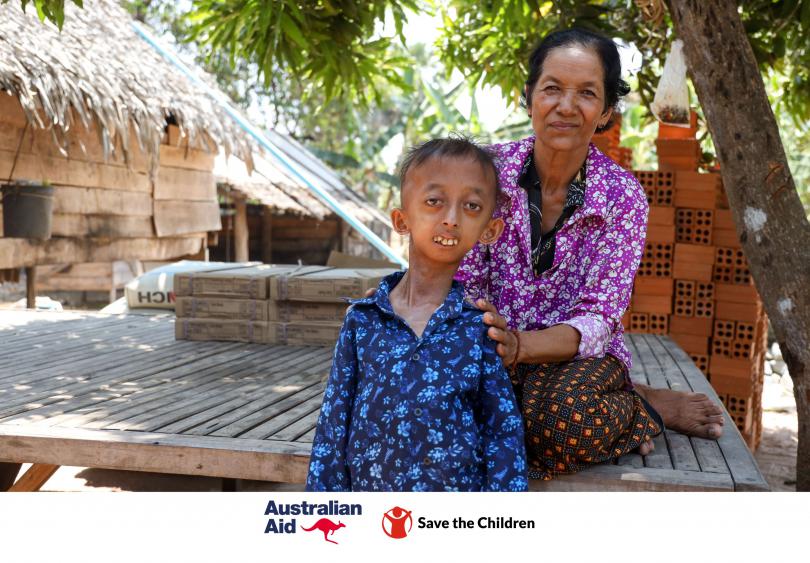A boy with a mobility impairment finds pleasure after receiving positive care

While participating in positive parenting sessions Ms. Phann Lot, a 62-year-old farmer, reflected on her past. She used to use aggressive behaviours to complain about her youngest son and now deemed as a bad memory.
Ms. Lot and her husband, Mr. Sar Hy, earn their living by farming and raising chickens and cows. They had six children together but unfortunately their second daughter and third son died because of illness [poliomyelitis]. Describing her difficulties, Ms. Lot told us that her youngest son, Hao, has mobility impairments.[1]
When Hao was two years old, he got a high fever and was immediately sent to a hospital for treatment. Unfortunately his health condition did not improve. As Hao grew older, his health became worse. He had limitations in performing certain acts, such as moving and sitting for short periods. As a result, he also could not attend school. Ms. Lot remembers, “My son could not do anything by himself. These include dressing, having a shower, eating, and even walking," she continued, "Back then, I often blamed and insulted him while serving him," adding that she sometimes left him unattended at home and without proper care.
The relationship between Ms. Lot and Hao was not satisfactory. He was constantly terrified to share concerns and needs with his mother, and every time he did, he received repeated complaints from her.. As a consequence, Hao’s mental well-being has been affected.
While standing by the wooden column of his house, Hao described his past experiences in tears, saying, "I cried and felt unhappy when I got blamed. I stayed alone in the field behind my house." He continued, "I frequently questioned myself why was I born differently." Nevertheless, Ms. Lot kept expressing her negative sentiments without noticing Hao’s pain.
In 2021, with support from the Australian Government through the Australian NGO Cooperation Program, Save the Children collaborated with the local authorities to establish the parenting group training in Ms Lots’ village. The training was facilitated by village volunteers and was about positive parenting. In collaboration with the local authorities, Ms. Lot was invited to join several meetings. There she started to learn more about positive discipline and understand her children's feelings. This new knowledge allowed her to better understand Hao, who needs exceptional support from his family members.
Later, Ms. Lot acknowledged that she feels deeply guilty about her inappropriate behaviour and the emotional suffering Hao experienced over the years. With the support of Save the Children, she has slowly learned to respond positively to his needs, ask if he needs additional assistance, and interact with him using nice words.
With these changes in her attitude, Ms. Lot is slowly building a stronger bond with Hao, making him feel secure and safe to share his concerns with her. Ms Lot says, “I’m happy to see the improvement in our relationship as now my son comes and talks with me about his needs and concerns.” Hao himself is now happy to talk with his mother about the additional support he needs. He says, "…now I feel warm and safe to share what I need from my mother, and I’m delighted to see her using sweet words to talk with me." Ms. Lot wants to see parents in the community raise their children positively, including expressing their love and creating a safe place for their children. "I want to see all parents raise their children with non-violence,” she says.

[1] a disability that affects movement ranging from gross motor skills, such as walking, to fine motor movement, involving manipulation of objects by hand.




